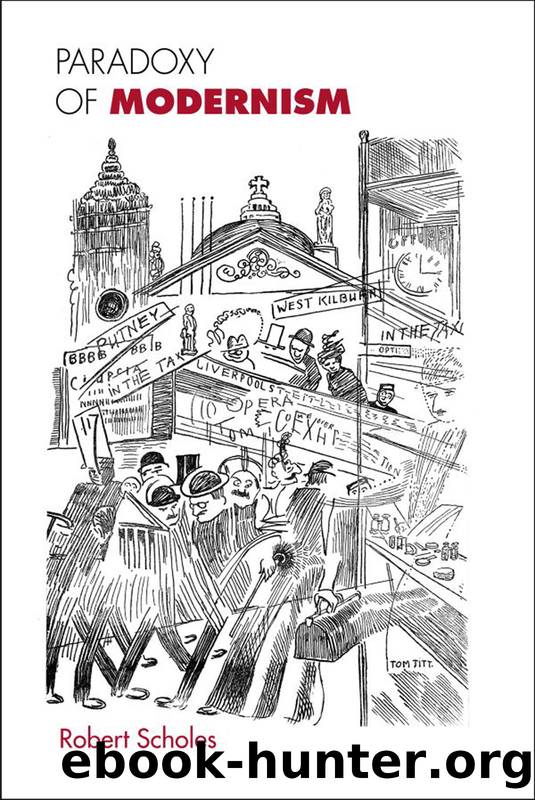Paradoxy of Modernism by Scholes Robert E

Author:Scholes, Robert E.
Language: eng
Format: epub
Publisher: Yale University Press
Published: 2006-07-14T16:00:00+00:00
6
Iridescent Mediocrity: Dornford Yates and Others
The more books we read, the sooner we perceive that the
true function of a writer is to produce a masterpiece and
that no other task is of any consequence. Obvious though this
should be, how few writers will admit it, or having made
the admission, will be prepared to lay aside the piece of
iridescent mediocrity on which they have embarked!
Sometimes, at great garden parties, literary luncheons, or in the
quiet of an exclusive gunroom, a laugh rings out. The sad, formal
faces for a moment relax and a smaller group is formed within
the larger. They are admirers of Dornford Yates who have found
out each other. We are badly organized, we know little about
our hero, but we appreciate fine writing when we come across
it, and a wit that is ageless united to a courtesy that is extinct.
There is, as you will have noticed, a striking contradiction between these two views. The first seems to set out the official program of High Modernism, while the second praises the work of a writer who never approached canonization in the Modernist pantheon. In fact, that gorgeous phrase “iridescent mediocrity” in the first statement might seem a particularly apt description of “the Berry volumes of Dornford Yates,” which are the subject of the second. The first of these pronouncements was made by Cyril Connolly. It is from the opening paragraph of his extended literary meditation, The Unquiet Grave. The second statement, as it happens, was also made by Connolly, at about the same time. It appeared in an essay called “The Novel-Addict’s Cupboard,” collected in The Condemned Playground. Clearly Connolly was a master of negative capability, holding two conflicting ideas in mind with consummate ease. Even the titles of these two books stand in eerie opposition to one another. But I bring these two passages together not to embarrass the shade of Connolly, who has, no doubt, greater things to atone for, but to point out something about the literature and doctrine of High Modernism itself.
Connolly, we may need to remind ourselves, was one of the few writers of his time to understand what James Joyce’s Ulysses was all about. His essay “The Position of Joyce,” written in 1929 and collected in the same volume as the remarks on Dornford Yates, is an eloquent argument for all of Joyce’s work, including the experimental Work in Progress. In this essay, Connolly makes a very persuasive case for Ulysses as a novel in which the central emotion is “remorse.” He really did understand both Joyce in particular and Modernism in general. His remark on the necessity of producing masterpieces is quintessentially Modernist. It describes what Joyce, Eliot, Ford, and Pound, for example, all thought they were doing. And Connolly, who edited one of the best literary magazines of the forties, Horizon, fully sympathized with the projects of those High Modernist writers and others who shared their aspirations.
How does it happen, then, that a person so committed to the High Modernist enterprise should single out for special praise a writer like Dornford Yates (the pen name of C.
Download
This site does not store any files on its server. We only index and link to content provided by other sites. Please contact the content providers to delete copyright contents if any and email us, we'll remove relevant links or contents immediately.
The Art of Boudoir Photography: How to Create Stunning Photographs of Women by Christa Meola(18629)
Red Sparrow by Jason Matthews(5476)
Harry Potter 02 & The Chamber Of Secrets (Illustrated) by J.K. Rowling(3677)
In a Sunburned Country by Bill Bryson(3543)
Drawing Cutting Edge Anatomy by Christopher Hart(3529)
Figure Drawing for Artists by Steve Huston(3452)
Harry Potter and the Prisoner of Azkaban (Book 3) by J. K. Rowling(3360)
The Daily Stoic by Holiday Ryan & Hanselman Stephen(3325)
Japanese Design by Patricia J. Graham(3178)
The Roots of Romanticism (Second Edition) by Berlin Isaiah Hardy Henry Gray John(2918)
Make Comics Like the Pros by Greg Pak(2918)
Stacked Decks by The Rotenberg Collection(2883)
Harry Potter and the Deathly Hallows (7) by J.K. Rowling(2726)
Draw-A-Saurus by James Silvani(2719)
Tattoo Art by Doralba Picerno(2670)
On Photography by Susan Sontag(2640)
Churchill by Paul Johnson(2587)
The Daily Stoic by Ryan Holiday & Stephen Hanselman(2579)
Drawing and Painting Birds by Tim Wootton(2512)
